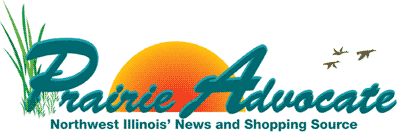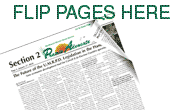

Discover rewarding casino experiences. 

Please Don't Quote Me PART II — WITH the coming of the century, turning from the 1800’s to the 1900’s, citizens were as excited then as we were in 2000, a hundred years later—and they didn’t have computers to worry about. active too. |
Heart of the Matter – ‘It is The Law,’ Sayeth the Illinois Dept. of Public HealthPart 5 - CommentaryBy Tom Kocal | Prairie Advocate News PubisherFor Part 1 - CLICK HERE, For Part 2 - CLICK HERE, For Part 3 - CLICK HERE, For Part 4 - CLICK HERE Please consider this commentary as Part 5 of the “Raw Milk Regulations and Transparency” series presented in this paper every week since the April 17 issue. Since my first contact with this issue on February 22, 2013 during the conference call conducted by the Dairy Work Group (DWG), it was apparent to me that being “transparent” was not one of the goals of the Illinois Department of Public Health (IDPH). “My farmer” (a term of endearment that many Raw Milk consumers use to describe the people who legally provide them with this product), Marc and Catherine Gravert of Spring Valley Farm in rural Fulton, first informed me about this issue 2 weeks before the 2/22 DWG conference call (and yes, I have been drinking raw milk for over a year, but is not my motivation for coverage of this regulatory fiasco). One only needs to refer to Parts 1, 2 & 3 to see that my claim of lack of transparency is actually fact: - Conducting several meetings to create rules and regulation with no input from Raw Milk producers or consumers, while having no presence of these shadow meetings posted on the IDPH web site - no notice, no agenda, no minutes, nada, zip; - The IDPH did not present the “Second Draft Amended Rules for the Sale of Raw Milk,” dated Jan. 11, 2013, to the lone Raw Milk representative on the DWG until the Feb. meeting; - The April 9, 2013 letter from IDPH Director LaMar Hasbrouck to the Illinois General Assembly that states HIS opposition to raw milk by claiming that “Unpasteurized milk cannot be considered safe under any circumstances.” Hasbrouck’s letter was presented to the General Assembly with actions listed that were not even in the proposed rules. Several times during the conference call, and at the May 1 DWG meeting in Bloomington (see Part 4) folks representing the Raw Milk advocates, both producers and consumers, asked for more details about the current law regarding the Sale of Raw Milk in Illinois. Apparently, no one could find the laws prohibiting (or allowing) the sale of Raw Milk. “There is not a rule on the sale of Raw Milk,” said Molly Lamb, Division Chief of the IDPH Division of Food, Drugs, and Dairies, at the May 1 meeting. The Raw Milk faction then asked a simple question: If it ain’t broke, just what exactly are you trying to fix with new rules and regulations aimed at stifling the operations of small farmers and restricting the choice of consumers? At that point, Chief Lamb stated that there were no specific rules regarding Raw Milk in Illinois. That’s right - NO RULES. Then, she added her position that since there are no rules, it is illegal to sell Raw Milk. Could that possibly be true? Is she inferring that because no laws exist as to which sock we place on our feet, left foot first, or right, that we are all law-breaking scoundrels every day that we don our footwear? Is that the purpose of the law? What IS the purpose of law?That’s an extremely broad question, so I looked up the definition in what many consider the lawyer’s “bible,” so to speak: Black’s Law Dictionary. In the Sixth Edition, page 884, a portion of the definition reads “Law, in its generic sense, is a body of rules of action or conduct prescribed by controlling authority, and having binding legal force . . . Law is a solemn expression of the will of the supreme power of the State.” That definition sums up the observations made by many citizens in the United State of America these days; that sometimes, this government establishes law in order to place “binding legal force” on its citizens, using the “supreme power of the State,” simply because they can. This is apparently the case with the IDPH and the proposed Raw Milk regulations. IDPH has expressed their desire to regulate and control Illinois’ Raw Milk farmers and consumers in the name of protecting the public. Protecting them from what? And from whom? I googled “unhealthy foods,” and every link that popped up excluded “Raw Milk” from their lists. They did list soda and other sugary sweet drinks (Coke or coffee in the morning?), processed meat full of salt and nitrites (Oh no! Not hot dogs and bologna!), and pasteurized whole milk products (Yes, ice cream and whole milk). But not one mentioned Raw Milk. No one, except the Food & Drug Administration (FDA), who claims that “Raw Milk is considered by FDA as potentially hazardous food.” That statement was made by FDA Representative Larry Trandel at the May 1 DWG meeting. “We do not consider raw milk safe for human consumption. All raw milk is considered potentially adulterated,” Trandel claimed. And not one of those other “foods” mentioned above are regulated by the FDA or IDPH - yet. Yet the FDA has considered allowing the pasteurized dairy industry to put aspartame into their chocolate and flavored milk products. Why? Isn’t it already flavored? Is regular whole milk next? Has pasteurized milk, too, lost popular appeal to the masses, resulting in the industry looking for a better taste - a taste more like sweet, fresh raw milk? Will the addition of aspartame remedy their marketing dilemma? Probably not, but it’s amazing how easily the general public can be fooled. Just look at the “unhealthy foods” found online, and you will see how the labeling of “health foods” must be carefully analyzed before consumption. Follow the moneyBecause of this stance by a federal, unelected agency, the IDPH (a state of Illinois unelected agency) has accepted federal funds in order to “protect the public.” But it is clear that the federal Food Safety Modernization Act, which Trandel states is legislated by Congress and directs FDA to further enhance their program to supply a safe food supply to the United States, is the reason why IDPH has accepted a grant from FDA - for the money. We all know that Illinois’ financial condition ranks dead last out of the 50 states in the union. Why not take the money? All the IDPH has to do is create a few new rules and regulations, and they’re funded for a couple of years. Job security. A case in point: Great emphasis was placed on “Rulemaking” during the Feb. meeting that included the Process and Reasoning of Rulemaking (ie: where the IDPH gets the authority to make rules). A bit too much emphasis. Over an hour’s worth, in fact. Yet, only 30 minutes was allocated toward “Public Comment,” and adhered to with great emphasis by Chief Lamb. Keep it simpleGetting back to what’s legal, we all understand that “Legal-eze” can be a bit too formal for some to grasp. Black’s Law Dictionary was a bit too much for me! Fortunately, I found a fairly concise answer while searching online for the “legal” answers. In the form of Six Purposes, this definition explains the intent of laws quite clearly: 1. To protect you from outside aggression or harm (robbery, assault, etc.) 2. To establish the rules needed for a society to live and work together (traffic laws, contract law, etc.) 3. To protect the fabric of society as agreed upon by the voice of the people or their representatives (pornography laws, marriage laws, drug laws, etc.) 4. To ensure that justice has been served 5. To punish people who commit crimes 6. To maintain social order I do not see any correlation with the above 6 points and regulating the production or consumption of Raw Milk. But I do see a correlation with other attempts by the state and federal government to regulate our lives, always in the name of “protecting us.” It’s legal to buy tobacco products and pay exorbitant taxes, yet the government decides where you can smoke. Now they can force you to buy health insurance. Are we losing sight of the freedoms we were awarded by our forefathers and those that have fought and died protecting those freedoms? Have we lost sight of our responsibilities in securing our freedoms? We are inundated with ads for legal pharmaceuticals that claim they will make us happy, healthy, and beautiful - approved by the FDA - with side effects worthy of a horror movie. Yes, we are being over-regulated as citizens, and we will continue to be, until We, the People, take action. The basis of the laws of this great nation, found in the U.S. Constitution and Declaration of Independence, are undeniably based on religious beliefs spanning millennia. One of our founding fathers, Samuel Adams, in a letter to John Trumbull on October 16, 1778, wrote: Religion and good morals are the only solid foundation of public liberty and happiness. We are a nation of many religious faiths. Many citizens work for the state or federal government in some capacity. Should the religiousness of people be separated from government and the role of people in government? At the risk of answering “no” to that question, I will refer to a Biblical quote that popped up as I was searching for the legal definition of laws and their purpose. “Because the law worketh wrath: for where no law is, there is no transgression.” – Romans 4:15, King James Bible (Cambridge Ed.) This translation from the New Living Translation (©2007) is a bit more clear: “For the law always brings punishment on those who try to obey it. (The only way to avoid breaking the law is to have no law to break!)” At the risk of violating the separation of church and state, maybe the Illinois Department of Public Health and the FDA should take this into consideration. Amen to that.
Loading
|
